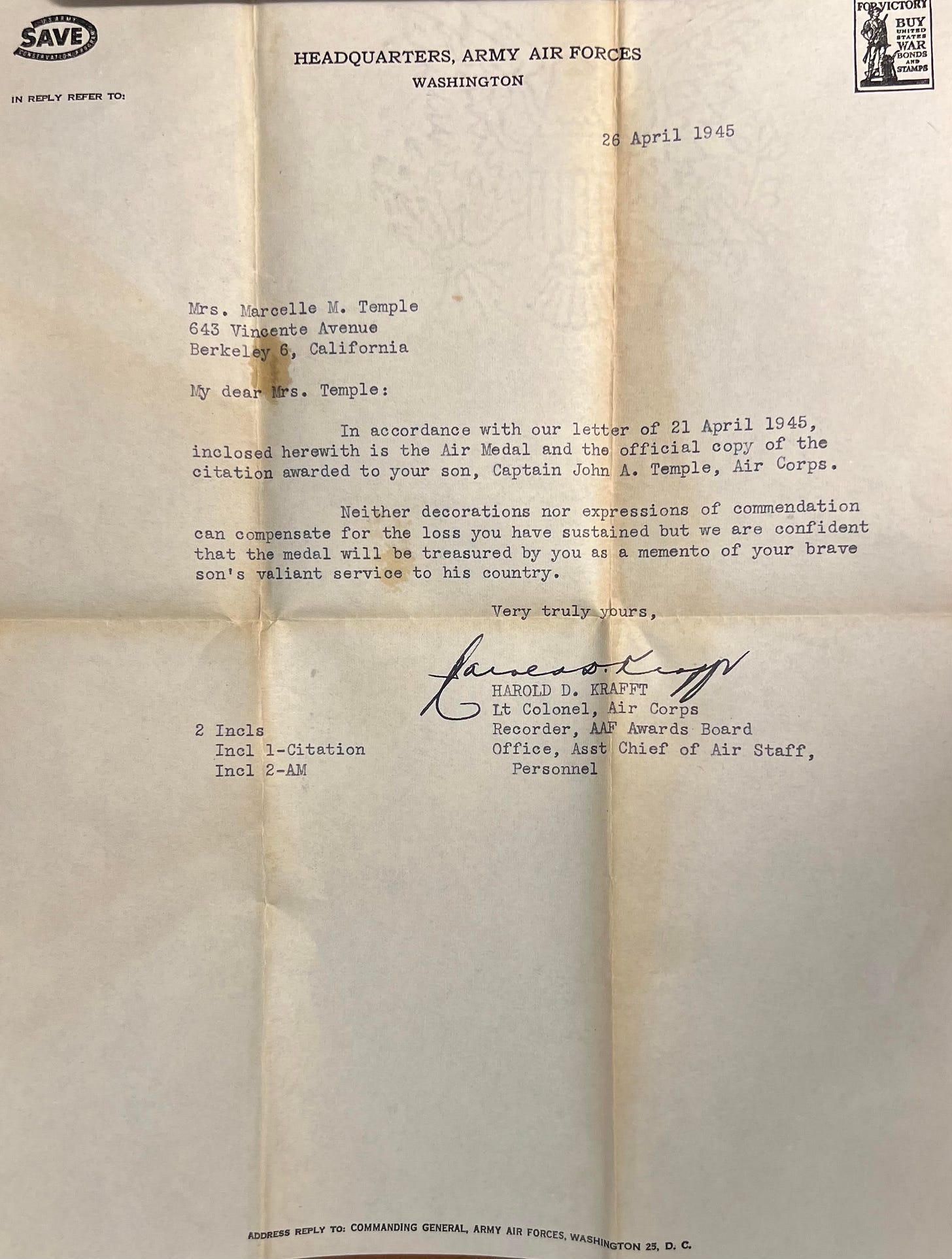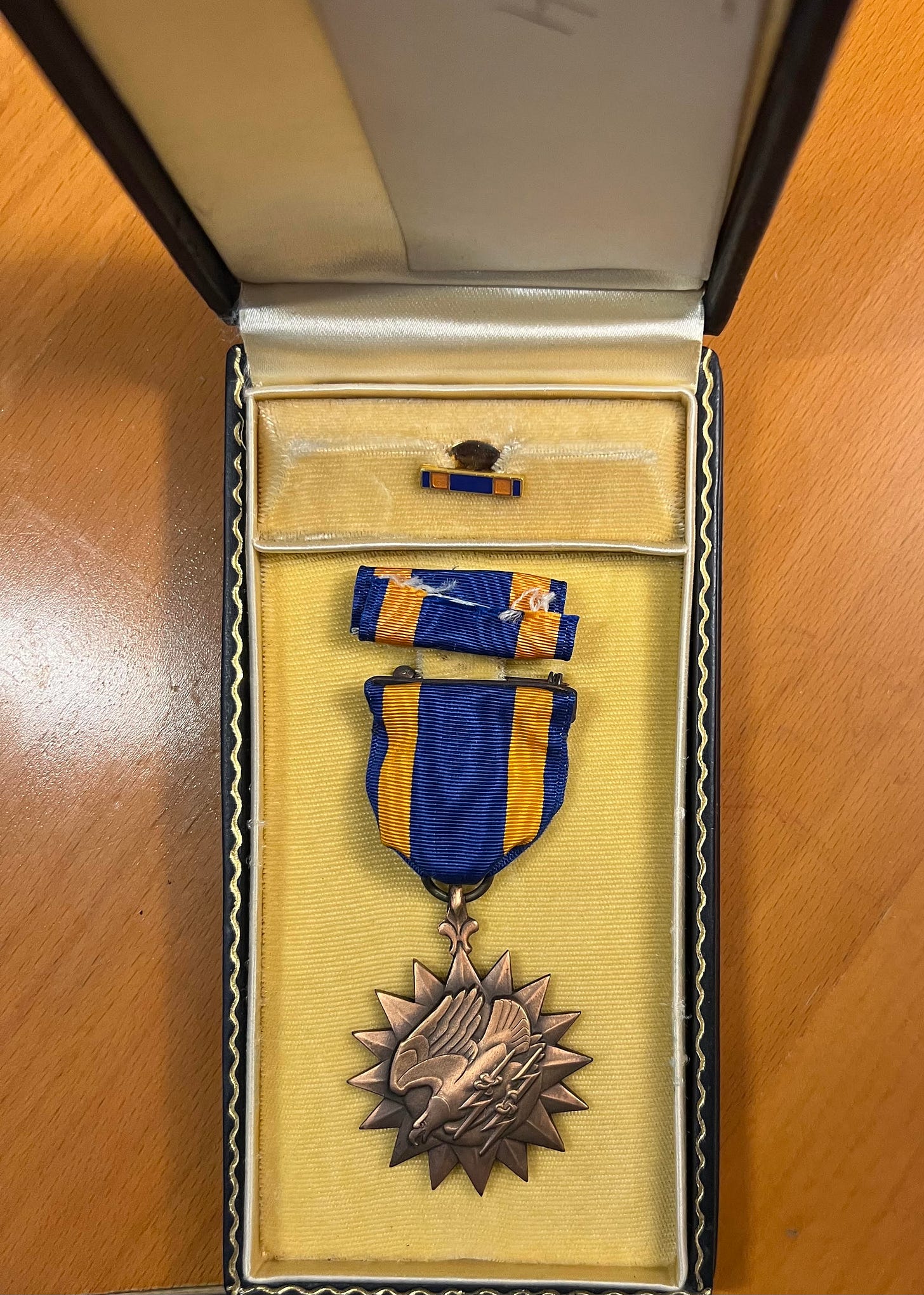On Memorial Day, Let’s Honor Every Sacrifice
... including those who died saving lives and teaching children.
I always remember two soldiers on Memorial Day. The first is my maternal grandfather, Col. John L. Temple, who was permanently scarred by mustard gas on the battlefields of World War I. The second is my uncle, Captain John A. Temple, an Army Air Corps pilot who died at the age of 24 in World War II.
The Colonel and his Son
My grandfather was born in 1875 and was in his fifties when my mother was born. He was much older than most of the soldiers under his command when his already-aging body was burned in that war’s trenches. He recovered and lived a long life but spent the rest of his years in pain. He kept his command presence until his death—enough so that it took a while before people noticed the redness and irritation of his skin, or the way his eyes tended to water.
Col. Temple was luckier than many of the other soldiers wounded by this chemical weapon. He was able to continue his military career and then work throughout the Southwest as a railroad detective for the Southern and Pacific. There, he began purchasing Native American artifacts for a few pennies or dollars each, carefully noting each item's details and providing details about its creator. "The last of the Chemehuevi weavers," one entry reads.
My grandfather was John L. Temple the Third, or Fourth, or maybe the Fifth—he didn't care much about such things—and he broke generations of tradition by refusing to pass his name on to his son. It was a typically American act of rebelliousness, or maybe just old-fashioned frontier contrariness; he only changed the baby's middle name. Col. Temple was faithful to duty, honor, and tradition in many ways, but he was born in a covered wagon headed West and nobody was going to tell him what to do.
His son, nicknamed Jack, died in World War II after taking a new bomber out for its first flight in the South Pacific. The plane's engines were sold to the military even though manufacturer, Curtiss-Wright, knew they were defective. (Curtiss-Wright's senior executives were fired and a general went to prison after Sen. Harry Truman's investigation. Jack, a former member of the Young Communist League, would not have been surprised at the price he paid for the greed of others.)
Jack Temple was a brilliant photographer whose works were exhibited in the 1939 World’s Fair when he was nineteen years old. His diaries and letters reveal an imaginative, unorthodox personality with a sensibility that might have felt at home in the Beat movement of the '50s or the counterculture of the '60s. He wrote that he wanted to reject the enslaving social norms of career and family and wander the planet without obligations.
Would he have done it? We’ll never know.
The Other Fallen
And yet, despite our nation’s emphasis on military losses, most of the working-age people who lost their lives during the pandemic were civilians: food, transportation, and retail workers, medical professionals, teachers, and many more. Conversely, a California study found that the “professional, scientific, and technical” group—which includes politicians and mainstream media journalists—had one of the lowest.
Maybe that’s why so few people seem to remember the sacrifice of these frontline workers. But there are those who keep watch and keep count. They tell us that 2,451 school staff and more than 4,000 health care workers have died from Covid-19. Together, that’s roughly the total number of military deaths suffered by the United States since World War II.
But even as the pandemic was raging, our president was ending every speech by saying “God bless our troops.” By all means, remember them, as my family has done. But once—just once—I would have liked to hear “God bless our teachers,” or “our grocery workers,” or “our medical workers,” or “our bus drivers.”
Memorial Day seems to have arisen organically from local commemorations—first of the Civil War’s Union dead, then of all the country’s fallen soldiers. But sometimes it seems as if we honor military deaths so that future generations will see these too-often needless losses as commonplace.
We should do the opposite. We should honor these losses by working for a world where nobody, soldier or civilian, dies needlessly again. We can start by demanding a ceasefire in Gaza and health care and safety for workers here at home.
Epilogue
Col. John L. Temple lived into his late nineties and saw astronauts walk on the moon. Jack Temple lives on in the personalities of his siblings and their descendants, in the dedication to social justice he instilled in his sister, and in his striking photographs.
Even the Chemehuevi tribe, whose lost art of weaving my grandfather once mourned, is clinging to existence. The "Ute-Southern Ute Ethnologue" of 2009 described the Chemehuevi as "near extinction,” and reports say less than five people still speak the language. But the tribe has a website and an active government, so it appears to be surviving for now. As of 2022, there were 342 people living on its reservation.
As for those who die in battle, the best way to honor them is by challenging those who still call us to war without reason, sacrificing innocent lives in the pursuit of imperial ambition. As we honor the martial sacrifices made by so many families like mine, let’s also remember those who died meeting the needs of everyday life—gently, lovingly, courageously.
Nobody will mention Colonel John L. Temple or Captain John A. “Jack” Temple from a podium today. And we won’t hear about the educators and health care workers who died serving society’s peacetime needs. But there are many families, many sacrifices, and many stories. This Memorial Day we should remember and honor them all.
For Jack Temple Skinner and Colt Alexander Skinner.
Educators we lost to Covid, 2020-2022
Education Week
(some of this material is adapted from an essay I wrote in 2011)



Thank you for this very important and moving piece on Memorial Day.
There's an obvious error ("They tell us that 2,451 school staff and more than 4,000 health care workers have died from Covid-19. Together, that’s roughly the total number of military deaths suffered by the United States since World War II.) This does not include Korean War, Vietnam war, among others. Also include those soldiers who committed suicides --more than died directly in Middle eastern Wars.
We should also memorialize those who fought against wars, including Vietnam wars (including Martin Luther King) and current wars.